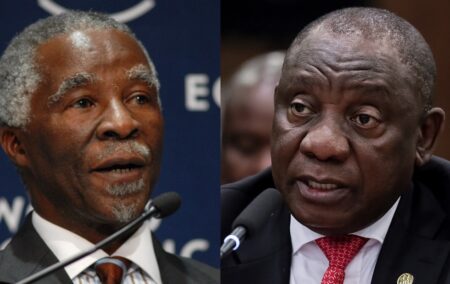My regard for Cyril Ramaphosa has never been lower than now, with his disastrous handling of the Covid-19 epidemic. His lockdown will kill far more poor black people than the disease would have done. However, opinion polls show many people think he is doing magnificently. This made me reflect on his career. I began to wonder what would have happened if he, instead of Thabo Mbeki, had become President of South Africa in 1999.
After 1976, when the African National Congress (ANC) realised it had lost control over ordinary black people, it began a determined, brutal and successful campaign to take over South Africa. It sought power not freedom. It fought almost entirely against other black groups trying to end apartheid, and used terror to do so. In those days there was no legal outlet for black protest against apartheid, and the ANC was justified in using illegal outlets – but not in slaughtering poor black people.
1979 saw the first of the two great reforms that ended apartheid; the recognition of black trade unions. (The second was the repeal of the Pass Laws in 1986.) The union movement now gave black people a legal platform to oppose apartheid. Ramaphosa, a union leader, seized the opportunity and began negotiating with great skill to improve black workers’ rights and, as an inevitable corollary, to give political rights to black people. This was his finest hour. It played a huge role, probably the most important of all, in ending apartheid. He played it in a charming way.
Meanwhile, as the legal means of protest opened, the ANC increased its illegal means. Terror and slaughter of poor black people accelerated. The hard men and women of the ANC pushed for necklacing (which they had not invented but eagerly adopted) against any black people their thugs did not happen to like that day.
Two-faced
The ANC was always two-faced: the hidden face ordered, encouraged or tolerated the burning to death of ‘enemies’ who might have included a poor black child trying to go to school; the open face smiled and invited white businessmen and politicians to negotiate. Oliver Tambo, the ANC leader, presented a gentle aspect to the world while urging torture and death at Quatro, its detention camp in Angola; he silently acquiesced to the burning of, among others, poor black children who tried to go to school,while sending his own children to expensive private schools in England. Ramaphosa smiled reasonably.
In the negotiations from 1990 to 1994, Ramaphosa ran rings around the fallen masters of apartheid, and helped secure the ANC triumph. He never had to face the hard men of apartheid; F W de Klerk did that for him. Nor did he ever face down the hard men of the ANC; they were happy with his charming success. He gave them what they wanted.
Up until 1996, when Ramaphosa left politics to go into business, it was neck and neck between him and Thabo Mbeki to become Nelson Mandela’s successor as president. Mbeki won for reasons of ANC in-house politics.
In 2017, Ramaphosa spent an enormous amount of money and energy to become president of the ANC and then president of South Africa. I wonder why. He didn’t need the money and seems to have no ideas of his own. Just a desire for fame, I suppose, as for so many other politicians.
During the Covid-19 lockdown, the ANC resumed the double act. Ramaphosa, as the charming front man, presented the cruel and stupid lockdown policies in a solemn, sober, serious, statesmanlike way. Behind him, his hard men and women leapt at the chance to spread fear and control, to shut down private enterprise, to harass any private body from trying to feed the homeless and the starving, to use policemen with guns and sjamboks to terrorise black communities, and to humiliate the poor and the lonely with idiotic edicts. In short, to advance the ANC’s National Democratic Revolution, which means total state (ANC) control over every aspect of the economy and everyone’s life. When Ramaphosa announced that the absurd ban on legal cigarettes would be lifted, the hard woman of the ANC, Dr Nkosazana Dlamini-Zuma, brushed him aside with contempt.
Better than Mbeki?
What about Ramaphosa as President in 1999? In one way, he would certainly have done better than Mbeki. He would have accepted that HIV causes AIDS, and so saved at least 300 000 lives. On Mbeki’s other surely criminal failure, his support for the murderous reign of Robert Mugabe in Zimbabwe – which led to the slaughter of tens of thousands of black people, changed the country from exporting food to starvation, caused 90% unemployment, and sent millions of black people fleeing over the borders – I doubt Ramaphosa would have done anything different. He would have grovelled to Dlamini-Zuma, who applauds Mugabe’s terror. His approval of expropriation of property without compensation shows his willingness, if pushed hard enough, to accept Mugabe’s property policies. Mbeki did quite well in preserving the soundness of the Rand and keeping some economic integrity. Ramaphosa would not have done as well, because he would have given way to his communists.
Ramaphosa gets my vote for the better president in 1999 – but entirely because of AIDS.
[Pictures: By World Economic Forum, https://commons.wikimedia.org/w/index.php?curid=4482261, and Palácio do Planalto, https://commons.wikimedia.org/w/index.php?curid=83966090]
The views of the writer are not necessarily the views of the Daily Friend or the IRR
If you like what you have just read, subscribe to the Daily Friend

